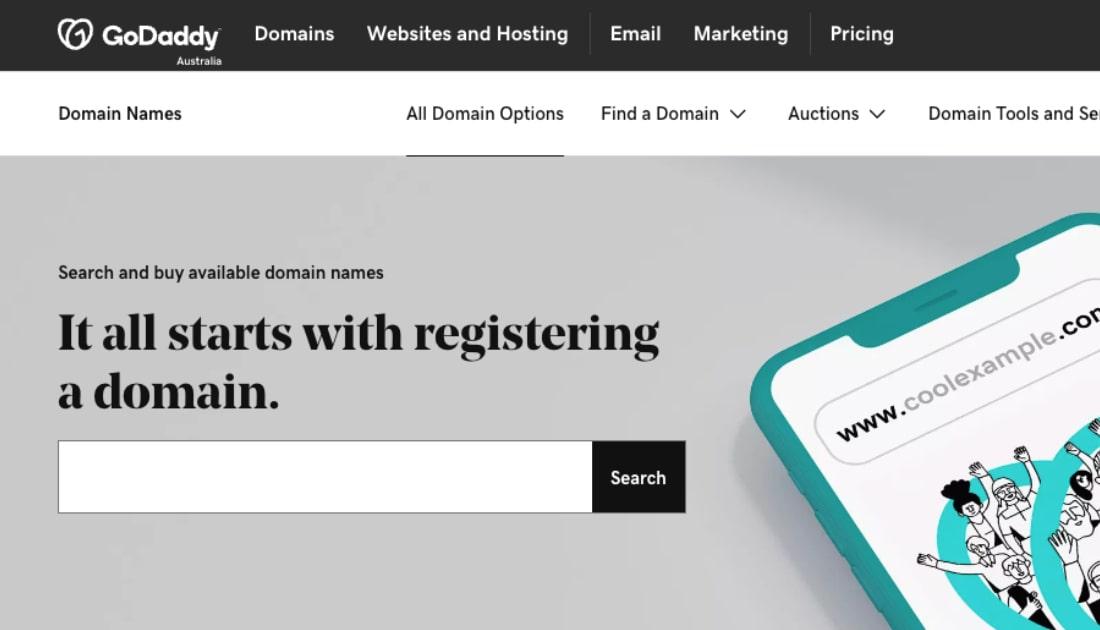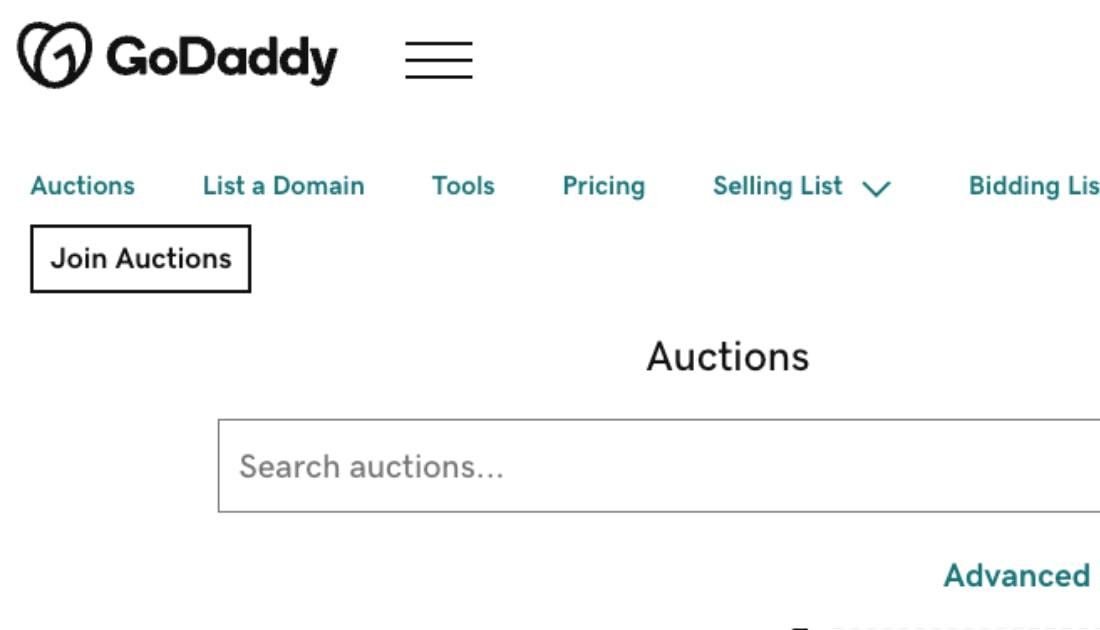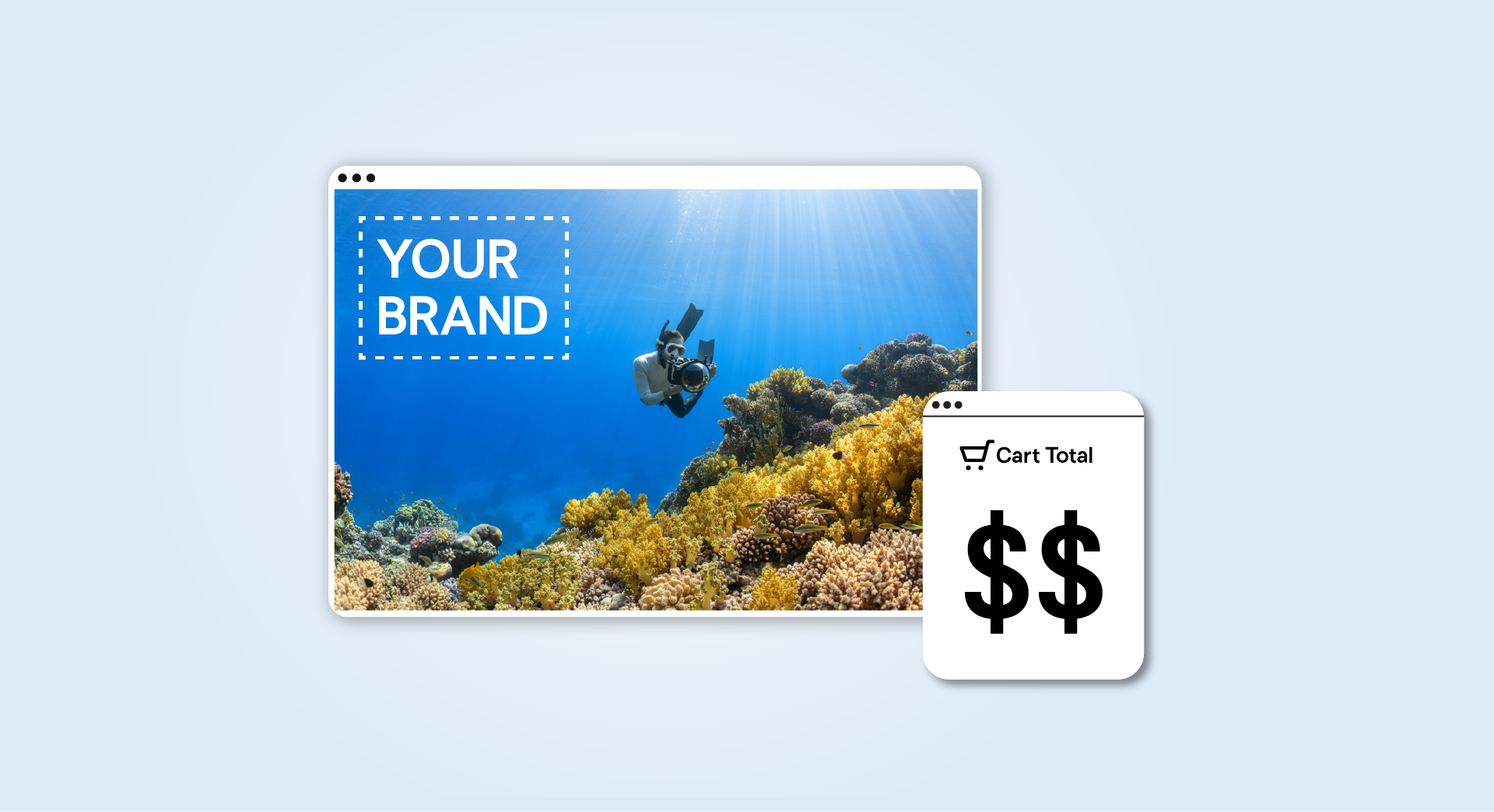When looking for a domain name for your business, personal blog, or portfolio website, there are a few important things to consider.
First, target a domain that’s easy for users to digest and doesn’t have misspellings, numbers or hyphens.
Second, search for domain names that reflect your brand, whether that means including your name, slogan or keywords associated with your targeted niche.
Last but not least, think critically about what top-level domain — aka domain extension — makes the most sense for your specific needs. With this one, it helps to know about the five most common domain extensions.
A domain extension is the characters following the period in a web address.
It’s used to designate the category or country code for a website. For instance, in GoDaddy.com .com is the domain extension and signifies that the website is for commercial use.
Get the perfect domain name now
What are the five most common domain extensions?

Choosing a recognisable domain extension could help you brand your online business. Here are the five most common domain extensions to consider:
1. .com
For people wondering about the five most common domain extensions, .com is hands-down the most popular top-level domain (TLD). It was originally used to designate for-profit businesses, but has now become the mainstay for domain extensions.
When deciding on a domain extension, in almost all circumstances, you should consider .com if it’s available.
The .com TLD is easy for users to digest because it is familiar.
Humans are creatures of habit. Many visitors have spent the past decade or more entering web addresses with .com extensions into their browsers. Thus, they are accustomed to this extension and almost expect it when hearing new domain names.

In fact, if there is a .com for your domain, there is a good chance visitors are accidentally landing on that domain instead of yours simply because of human error.
The .com extension isn’t just the most popular because of its familiarity. Many SEO companies claim the .com extension can lead to more favorable search rankings. From a backlinking perspective, a domain with .com carries much more authority than one with a new or unfamiliar extension. Thus, when conducting outreach for backlinks, you’re likely to generate more interest and credibility using a domain with a .com, rather than another TLD.
Australian businesses can get the best of both worlds in .com.au. This Aussie-specific .com shows that your website is commercial and made for Australians.
The downside of .com
The pros to picking .com are apparent, but there are also some cons. The main reason you wouldn’t pick .com for your new website is your domain is probably already taken. When the internet and web development first took off, many entrepreneurs purchased domain names to flip them for more money. If your .com is not being used, you might have to pay a premium to purchase it from the current owner.
If you have the opportunity to get a .com, you should jump at it. However, if you can’t find a good .com — or don’t want to invest a lot of money to purchase the rights — there are other viable domain options.
Related: How to buy a domain name if your first choice is taken
2. .net
Much like the .com extension, .net is open to anyone. What was originally intended for internet service providers or networks has now become a great alternative to .com. This extension is also a nice option for tech- or application-based companies because it implies network and technology.
Many people associate .net with web-based applications and services.
If your business operates in those industries, .net makes perfect sense and can help validate and communicate your services. In addition, .net is in less demand than .com, meaning there is a greater likelihood that your desired domain is available.
Not for everyone
Because many people associate .net with technology, businesses that operate outside the tech space or web-service industry could disconnect with visitors’ expectations.
For example, if you operate a baking business and wanted a .net domain, you might think Cookies.net would be perfect. However, users might think your business provides a service for web cookies rather than tasty baked goods. This disconnect could keep people from coming to your site and confuse those who do land on your domain.
One brand using .net effectively is SourceForge.net. They are a web-based service that provides an online community for people who need help with open-source web projects. It’s a collaborative community focused on networking and technology-based business.
SourceForge understands how their .net extension positions their brand, and they have used it to their advantage to grow their credibility and community within the IT space.
3. .org
The .org extension is also open to any person or entity, even though it was originally designed to represent not-for-profit and charity organisations. It’s a popular option for many:
- Non-governmental organisations
- Nonprofits
- Politicians and political parties
- Online communities
The .org extension is one of the original TLDs, so it carries a lot of the same search power as .com. Additionally, .org is less popular than .com, which means you have a better chance to acquire your perfect domain. These are just two of the reasons .org domains are some of the most popular on the web.
People associate .org with a trustworthy and reliable source of information, rather than commercial brands.
While .org might make sense if you operate a not-for-profit or information-driven business, it doesn’t make sense for everyone. For instance, many people associate .org with communities and knowledge bases, so if you operate an eCommerce store and simply try to convert all your traffic into sales, .org wouldn’t be the best choice.
The place for communities
The websites that do the best using .org focus on building and cultivating communities. For instance, Wikipedia, Craigslist and WordPress are all brands that use .org. They all provide different services, but rely on their communities to grow their brands and share knowledge and information.
4. .co
The .co extension is an interesting option. It was originally designated as the country code for Colombia, but has become a popular option for global domains. The .co TLD is a familiar acronym for company, corporations or commercial ventures. This familiarity has led many forward-thinking businesses to build their brands on a .co.
Creating a website with .co makes sense if you are a business, particularly if you’re a young startup that markets itself as original or unique. While .com might be the most popular and widely accepted, .co is newer, shorter and more in line with the brevity of younger generations.
This freshness could be a great way to diversify your brand and target a younger demographic.
You might also consider registering a .co extension because of its domain availability. As mentioned previously, premium .com domains are rarely available. And if they are, you’ll have to pay more than you might like. However, .co domains are less sought after, which gives you more flexibility and options.
With all that said, .co is still less recognisable than .com — and does carry less credibility and familiarity. You risk losing out on the reputation that comes with a .com extension, and if there is a .com using your existing domain, you could potentially be sending traffic their way. Sometimes, adding the “m” is just habit, so even if a visitor is trying to visit Cookies.co, force of habit could send them to Cookies.com.
500.co (aka 500 Startups) is a popular brand that uses .co. It’s a venture fund and seed accelerator that targets early-stage startups. They epitomise .co because their target audience is innovative and unique businesses.
5. .au
Like .co (Colombia) and .cn (China), Australia has a two-letter country code of its own: .au. In fact, Australia has its own versions of several of the domain extensions mentioned above:
- .com.au for commercial enterprises of all kinds
- .net.au a great alternative if your .com.au is taken
- .org.au the place for Aussie communities
If your customers are primarily within Australia, using one or more of these domain extensions for your website will help you benefit from the buy-local movement that has bloomed during COVID-19. A web address such as YourBusiness.com.au tells everyone at a glance you’re located right here in ‘Straya.
Other domain extension options
There are hundreds of domain extensions available, in addition to the five most common domain extensions above. Below are some other popular options:
- .melbourne: for businesses and groups in Melbourne
- .sydney: for businesses and groups in Sydney
- .wtf: this extension says "You have to see this!"
- .style: great for lifestyle blogs anywhere in Australia
- .pub: perfect for the local pub or a brewer's blog
There are a lot of considerations that go into picking out the perfect domain name. In addition to finding a name that reflects your personal or brand identity — and is easy to remember and type — you must also make sure the domain extension matches your needs.
If you’re looking to register a domain using one of the most common extensions, then you should consider GoDaddy. They have a large marketplace of domains, so you can find the perfect one for your new website. The best part? You can also host your website with their WordPress Website platform, set up your site with ease.


![What Are The Five Most Common Domain Extensions Wiki]](https://www.godaddy.com/resources/wp-content/uploads/what-are-the-five-most-common-domain-extensions-wiki-min.png)








